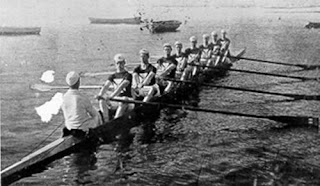One of the reading this week was critical of the benefits of sporting metaphors in the discussion of teams, but after years of rowing I think that I can consolidate my own learning through a comparison of this sort.
The major message that I got from the various articles I've ploughed my way through this week is that teams need a clarity of purpose. Every member needs a thorough understanding of where the team is going, why and how they will get there. No rowing crew would succeed without that shared vision of what they want to achieve, and it is standard practice for a squad to gather at the beginning of the year to discuss exactly what they want to get out of the upcoming season. While the overall purpose of a school does not change from year to year, it is still beneficial to refresh that vision each year and focus on any areas that may need attention.
Once in the boat it is obviously important for a crew to work together. It is not simply enough to be in time with each other; We must apply pressure to the water equally and accelerate through the stroke at the same rate. It requires considerable physical effort, and even more of mind, but the benefits to boat speed are amplified through this togetherness and the sum of the whole really does become greater than that of the individual parts. Thus, it is not uncommon to see crews beat opponents who are considerably taller and stronger but lack cohesiveness. This same principle can apply equally in schools. If every member remains committed and focused to the vision, applying themselves in terms of time and effort, they can achieve great things.
However, neither boats nor schools will achieve this vision and commitment without some sort of leadership. In a boat crew leadership is assumed by the coach. It is his/her responsibility to keep the crew on track, and it is be the quality of this leadership that truly determines the success or failure of the crew. The ability to assign roles to the most suitable individuals, to keep training interesting/fun, to push hard at the right moments and ease back with some social bonding when needed. Perhaps the hardest task of all, and rarely achieved by coaches in my experience is to motivate through praise. Comments during an outing will inevitably focus on areas that need improvement and rowers can quickly become quite negative in their thinking. The same is true in any environment, and especially in schools, where we are all very aware of the need for positivity with the children. We need to remember that that same attitude will also work wonders with our fellow staff.
Leadership is also about being able to delegate responsibilities and stand back a little to see what happens. Kevin Rudd's failing as leader of the ALP was apparently his constant micromanagement of those around him. In rowing a good coach trains up a cox to lead the crew on the water, but will also have leaders in key positions throughout the boat, although this obviously varies according to the size of the crew. Schools need to do the same, as this trust and shared responsibility is essential for making individuals feel they have a real stake in the quality performance of the team.
Another great parallel here, and the one I will finish with, is the ability to recognise internal and external variation. In rowing, a good crew will look as solid as a rock regardless of the conditions of the wind and water. Those beginning in the sport, and many that may have been at it for a number of years, look at these crews and wonder how they manage to maintain this apparent ease while they roll around on every stroke and are in a constant battle to find any kind of balance. The leaders of those great crews have worked hard to achieve this appearance of ease by recognising what difficulties are caused by internal faults and what are caused by the external conditions. they know that the majority of problems are external, and will not waste time reacting to these. Those crews rolling around and making hard work of it are reacting to variations they cannot control instead of fixing what really needs to be fixed. In schools we must do the same, recognise what is natural variation beyond our control and focus on streamlining our efforts to improve what can be improved.
